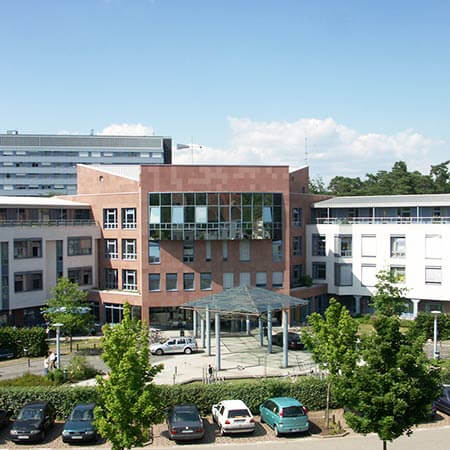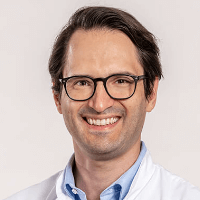Brain Angioma — Platinum Coils Embolization (coiling): treatment in the Best Hospitals in the World
Treatment prices are regulated by national law of the corresponding countries, but can also include additional hospital coefficients. In order to receive the individual cost calculation, please send us the request and medical records.

Department of Interventional Neuroradiology
The Department of Interventional Neuroradiology offers the full range of services in the areas of its specialization. The medical facility provides imaging diagnostics and low-traumatic image-guided interventional treatment of nervous system diseases. The department's specialists have rich experience and exceptional professional skills in the field of interventional procedures for acute and chronic vascular diseases, such as ischemic strokes, brain hemorrhages, cerebral artery stenosis, brain aneurysms, and vascular malformations. The department's neuroradiologists cooperate closely with neurologists and neurosurgeons so that each patient receives an optimal treatment regimen based on the expert opinions of the specialists. The department's medical team has state-of-the-art computed tomography (CT), magnetic resonance imaging (MRI), and MR angiography systems that are actively used for diagnosing patients and therapeutic procedures. Medical care is provided in compliance with current clinical protocols. The department also offers many outpatient medical services, which is an advantage for many patients.




Department of Adult and Pediatric Diagnostic, Interventional Neuroradiology
The Department of Adult and Pediatric Diagnostic, Interventional Neuroradiology offers the widest range of services for the diagnostics and treatment of diseases of the brain, spinal cord and peripheral nerves using the advanced imaging systems. The department is equipped with modern technical devices, including 64-slice CT scanner, 1,5 and 3,0 Tesla MRI, biplane angiography system with 3D imaging of the blood vessels and bone structures, system for myelography of the entire spine and ultrasound scanners. All these devices are used not only for the diagnostics, but also for interventional procedures to treat obstructions, stenoses and other pathological vascular lesions in the head, neck and spine. The most popular interventional therapeutic procedures include clipping and coiling of cerebral vascular aneurysms, as well as cerebral vascular malformations. The department's doctors cooperate closely with specialists in the field of neurosurgery, neurology and pediatric neurology. Such an approach guarantees the patient a comprehensive assessment of the state of the nervous system and a favourable treatment outcome.





Department of Interventional Radiology
The Department of Interventional Radiology offers the full range of imaging examinations, as well as innovative image-guided minimally invasive techniques for the treatment of tumors, vascular diseases and internal pathologies (for example, CT, MRI, PET-CT, SPECT). The department's doctors have deep knowledge and colossal experience in the field of interventional radiological methods of treatment, which represent an excellent alternative to open surgical interventions. Despite the high level of technical equipment and the presence of advanced computerized systems, the focus is always on the person with his individual needs. Compliance with current clinical protocols and high professionalism of the department's specialists contribute to the successful clinical practice, as well as the reputability of the department among the best medical facilities of this kind in Germany.



Brain angiomas are a separate group among all cavernous angiomas of the central nervous system because of the high tendency of these malformations to recurrent hemorrhage, and because of the complexity of their surgical treatment that is associated with a high risk of deterioration.
Overview
Cavernous angiomas are most often congenital vascular anomalies, represented by single or multiple cavities that are separated inside by septa and filled with blood. The blood filling the cavities is carried out by small arterioles and capillaries, and the outflow of blood is through the veins. Due to the small caliber of the supplying vessels, the blood pressure in the angiomas is low, therefore, the draining veins are poorly visible on CT/MRI/angiography. The peculiarity of the angiomas is a very thin defective vascular wall, so thin that the cellular elements of the blood – erythrocytes, can go through it and accumulate in the adjacent medulla. This process is called hemorrhage. The products of the breakdown of hemoglobin, contained in erythrocytes, form a zone of chronic, specific, and very recognizable changes on MRI around the brain angiomas.
They can be localized in any part of the brain, mainly in the cerebral hemispheres, as well as in the brainstem, cerebellum and subcortical nodes, in the corpus callosum, and the lateral ventricles. In about 30-40% of cases, cavernous angiomas are combined with another type of vascular malformations – venous angiomas. Venous angiomas are an anomaly in the development of venous vessels in the form of a "bundle" of small veins gathering into one large drainage vein.
As a type of angiomas, cavernous hemangiomas are characterized by an increased number of normal or abnormal blood vessels. The key difference between angioma and hemangioma is that the term angioma is used to describe a wide range of benign tumors of different origins, while the term hemangioma is used specifically to distinguish benign tumors composed of blood vessels.
The incidence of brain angiomas is several cases per million of the population.
Brain angiomas can be asymptomatic. However, in some patients, there can be clinical manifestations of two types, manifested either individually or in combination.
- Hemorrhage.
Sometimes, an increase in blood pressure inside the brain angioma leads to local destruction of the vascular wall and the formation of intracerebral hemorrhage. Unlike arteriovenous malformations, hemorrhages caused by brain angiomas are never massive and rarely pose a threat to the patient's life, except for extremely rare cases of the location of brain angioma in the lower parts of the medulla oblongata, where the centers of cardiovascular and respiratory regulation are located. However, when the focus of hemorrhage is located in any functional area, hemorrhage of even a small volume can lead to the development of neurological symptoms.
- Epileptic syndrome.
In some cases, due to the chronic presence of hemosiderin (the result of erythrocytes breakdown) in the medulla or the development of acute hemorrhage, a focus of pathological cerebral bioactivity can form. It is manifested clinically by epileptic seizures – convulsive, non-convulsive, absences, vegetative, polymorphic, and others.
Generally, brain angiomas rarely pose a threat to the patient's life but can have a noticeable effect on the patient's health.
Angiomas are a very common type of benign tumors. Despite their somewhat frightening name, they sometimes do not require any treatment and regress spontaneously within a few months. However, it is worth taking into consideration that the necessity of treatment is identified for each patient individually.
Diagnostics
In many cases (about 50%), the patient may not have any signs of the disease, and the brain angioma is found on computed tomography or MRI examinations that are made for other reasons.
Symptoms can occur in the case of a rapid size increase of the brain angioma or when a thin vascular wall ruptures and the development of cerebral hemorrhages occur. If hemorrhages occur in so-called functionally important areas of the brain, brainstem, or spinal cord, neurological disorders can develop. But the most common symptom caused by brain angiomas is epilepsy (50%).
Brain angiomas are called "angiographically invisible" malformations. This means that despite the fact that brain angiomas consist of blood vessels, they sometimes cannot be detected with vascular examinations, i.e. by computed tomography angiography (CT), magnetic resonance imaging (MRA) angiography, or digital subtraction angiography.
However, in most cases, computed tomography (CT) is a relatively simple and available examination method that is mainly used for the urgent diagnosis of hemorrhages (hematomas) but is not sensitive enough to detect small cavities and to assess such structures as the brainstem and spinal cord.
The most accurate diagnosis can be made by performing a contrast magnetic resonance imaging (MRI) scan. It is very important to have this test in an institution where it is interpreted by experienced neuroradiologists who specialize in diagnosing brain and spinal cord malformations.
Patients should undergo regular MRI examinations to monitor possible changes in the size of cavernous malformations (which can often be asymptomatic) and possible development of new cavernous malformations.
Treatment
Treatment of brain angiomas depends largely on the location of the pathological focus, the size of the malformation, and the risks of cerebral hemorrhages.
Most treatment options include surgical interventions under the guidance of experienced neurosurgeons. If the brain angioma is small, a minimally invasive procedure is performed, i.e. endovascular embolization. However, if the brain angioma is large and is located on the surface of the brain, then open surgery is more suitable. The skull is opened and the malformation is excised. At the same time, important centers of the brain remain undamaged. To remove a pathological focus deep in the brain, open surgery is not performed, as the risk of damage to important brain structures is too high.
Embolization does not require large incisions and is rarely associated with complications. Before embolization, the surgeon performs selective angiography to establish the exact location of the malformation. For the direct assessment of the affected area, a catheter is inserted into the femoral vein. It gradually moves through the vessels of the body and reaches the malformation site. Further, platinum coils are inserted into the pathological vessels, blocking blood flow in this area. The whole essence of the embolization is to exclude abnormal vessels from the systemic blood flow.
Endovascular embolization is the only available option when open surgery is impossible due to the location of brain angiomas in the deep layers of the brain tissue. Sometimes, instead of coils, a special drug is injected that blocks blood vessels. Cessation of blood flow does not occur immediately. Several days should pass after the operation. If no hemorrhage occurs during this period, the procedure can be considered successful.
Where can I undergo platinum coils embolization (coiling) abroad?
Health tourism is becoming more and more popular these days, as medicine abroad often ensures a much better quality of platinum coils embolization (coiling).
The following hospitals show the best success rates in platinum coils embolization (coiling):
- University Hospital Saarland Homburg, Germany
- HELIOS University Hospital Wuppertal, Germany
- University Hospital Rechts der Isar Munich, Germany
- Vivantes Neukölln Hospital Berlin, Germany
- University Hospital Ulm, Germany
You can find more information about the hospitals on the Booking Health website.
The cost of treatment abroad
The prices in hospitals listed on the Booking Health website are relatively low. With Booking Health, you can undergo platinum coils embolization (coiling) at an affordable price.
The cost of treatment varies, as the price depends on the hospital, the specifics of the disease, and the complexity of its treatment.
The cost of treatment with platinum coils embolization (coiling) in Germany is 17,478-34,431 EUR.
You might want to consider the cost of possible additional procedures and follow-up care. Therefore, the ultimate cost of treatment may differ from the initial price.
To make sure that the overall cost of treatment is suitable for you, contact us by leaving the request on the Booking Health website.
How can I undergo platinum coils embolization (coiling) abroad?
It is not easy to self-organize any treatment abroad. It requires certain knowledge and expertise. Thus, it is safer, easier, and less stressful to use the services of a medical tourism agency.
As the largest and most transparent medical tourism agency in the world, Booking Health has up-to-date information about platinum coils embolization (coiling) in the best hospitals. We will help you select the right clinic taking into account your wishes for treatment.
We want to help you and take on all the troubles. You can be free of unnecessary stress, while Booking Health takes care of all organizational issues regarding the treatment. Our services are aimed at undergoing platinum coils embolization (coiling) safely and successfully.
Medical tourism can be easy! All you need to do is to leave a request on the Booking Health website, and our manager will contact you shortly.

